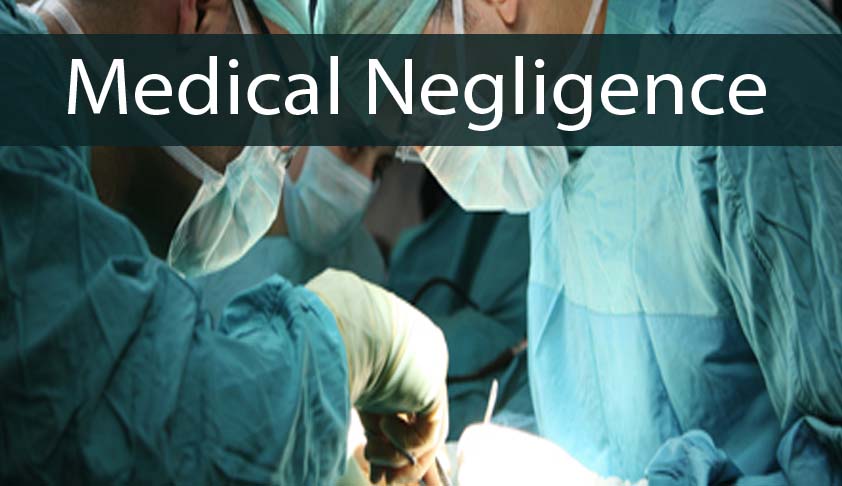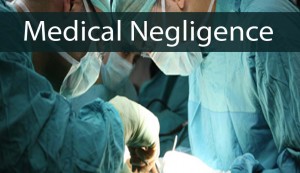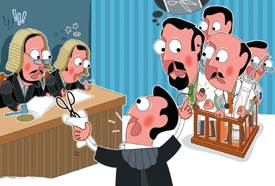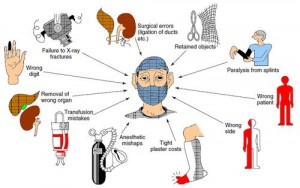In this blog post, Sakshi Jain, a student of Amity Law School, Lucknow Campus, writes about the concept of medical negligence, discussing in details the scenarios in which a doctor’s action in his professional capacity would be considered medically negligent and the legal defences that a doctor take in case he/she is accused of medical negligence.
Doctors are termed as life savers on earth. They have been given a place next to God. There is a certain amount of trust that people repose in doctors that they will not behave negligently during the treatment. The care should be of a very reasonable nature. If the doctors act negligently, then this will result in the breach of trust.
Indian society is becoming increasingly aware about patients’ right[1] It is the duty of the doctor to treat his patients well and with due care and if any mishap occurs, then the authority and doctors will be liable for compensation. That is why, due to medical negligence, many hospitals and doctors are facing complaints regarding mismanagement, poor facilities, erroneous treatment and negligence.
Negligence is the breach of a legal duty to care which a doctor owes to his every patient. The law mandates a certain amount of care which every doctor should undertake. Therefore, the breach of legal duty helps initiate action against negligence. When a person offers medical advice to another, it is impliedly understood that he has a skilled knowledge about the concerned health issue and will take care of it. In the case of State of Haryana v. Smt. Santra, the Hon’ble Supreme Court held that every doctor “has a duty to act with a reasonable degree of care and skill”.[2]
It is the duty of every doctor to treat their patients carefully, but it does not mean that every person is perfect on his own and cannot make mistakes. Sometimes, even the most renowned specialists make mistakes in the process of treatment or diagnosing the disease. Thus, it is to be proved that the act was done negligently and without taking due care. However, if it is proved that the act was not done negligently and was just a mere mistake or misconception on the part of the doctor, then they will not be held liable. Doctors can be held liable for negligence only if one can prove that he/she is guilty of a failure that no doctor with ordinary skills would be guilty of, if acting with reasonable care.[3]
Doctors are liable individually or vicariously when they charge fees for their service but cannot be held liable when no fee is charged by them. Service is the main ingredient for constituting medical negligence, and service has the same meaning as defined in Section 2 (1) (O) of Consumer Protection Act, 1986. In Dr. Laxman Balkrishna Joshi v Dr. Trimbak Bapu Godbole, the Supreme Court held that if a doctor has adopted a process with due care and in the areas he specializes in, then a mere mistake would not be enough to constitute negligence.
When a doctor is exercising an ordinary degree of skill in which he has a specialized knowledge, then he would not come under the preview of negligence if any of his acts constitute a minor mistake for which he took reasonable and due care. So, the patient cannot blame the doctors if they have not been totally cured for which the doctor has worked in a manner suitable for the betterment of the patient.
In certain cases, the Latin maxim Res Ipsa Loquitur will apply which means, the thing speaks for itself. In these circumstances, the accused does not have to prove the wrong done by the doctor. In these cases, the things will speak for themselves, and the doctor will automatically be held liable for his negligent act. This principle was applied in the case of Dr. Janak Kanthimathi Nathan v. Murlidhar Eknath Masane[4].
Provisions under the Indian Penal Code, 1860
Section 304A of IPC, 1860 defines death caused by negligent act. It is a criminal negligence and also a punishable offense under Section 304A of IPC. The Section states that:
Whoever causes the death of any person by doing any rash or negligent act not amounting to culpable homicide, shall be punished with imprisonment of either description for a term which may extend to two years, or with fine, or with both. There is a difference between the liability in civil laws and liability in criminal laws. Under civil laws, it is based on some damages occurred under the tortuous liability which is a civil wrong but under criminal law, the degree and the amount of negligence are the most basic factors to be considered. Section 304 A is a criminal offense for any rash or negligent act which is punishable by two years of imprisonment.
But the doctors cannot be held criminally liable for an act for which they took due and reasonable care. It must be shown by the accused that the act was done negligently or the doctor was incompetent while performing his duties. Therefore, a mere mistake cannot put doctors behind bars.
Section 80 and 88 also deals with the defenses which can be claimed by the doctors accused of criminal liability.
Section 80 – An Accident in doing a lawful act
Nothing is an offense which is done by accident or misfortune and without any criminal intention or knowledge in the doing of a lawful act in a lawful manner by lawful means and with proper care and caution.
This Section would save the doctors from the criminal liability if the act was done by accident or act was a result of any misfortune. But the condition here is that there should not be any criminal intention for doing that act. The other condition is that the act was done in a lawful manner. When the particular act is done unlawfully, the person cannot be granted the benefit of this section.
Section 88
Nothing which is not intended to cause death, is an offence, by reason of any harm which it may cause, or be intended by the doer to cause, or be known by the doer to be likely to cause, to any person for whose benefit it is done in good faith, and who has given a consent, whether express or implied, to suffer that harm, or to take the risk of that harm.
When the consent was given by the patient to do a particular act, then the doctors will not be held liable if he has done it in good faith. Volenti non fit injuria is the maxim which speaks when a person voluntary, with his consent, makes any decision and cannot claim for compensation if any injury occurs to them. Therefore, these two sections save the doctors from any criminal liability when done in good faith, with the person’s consent, without any criminal intention, and in a lawful manner.
Breach of trust of patients
Medical negligence is increasing day by day, and no initiative is made to cope with it.On May 2016, a Delhi-based private hospital, namely Maharaja Agrasen Hospital was held liable for medical negligence and was ordered by National Consumer Disputes Redressal Commission to pay compensation of Rs 64 lakhs to the child’s mother, Pooja Sharma. The complaint was against the medical practitioners who did not take care of the premature baby of nearly five weeks who was under the care of the hospital authority. The infant was not screened properly which resulted in the displacement of the infant’s retina.
Another case is the case of Yeshwantrao Chavan Memorial Hospital, against whom the complainant’s (Balasaheb Dhendge) family filed a complaint about negligent surgery which in turn resulted in him to lose his leg. Dhendge is a marginal farmer of 30 years who was admitted to the hospital on 16th September 2015. Dhenge’s family was compensated with Rs. three lakhs in the form of financial assistance.
Another case is from Rampur, Uttar Pradesh. The head of the baby was severed or separated out of the body during delivery. The doctors forcefully pulled out the infant from the womb which resulted in the separation of head from the body. The name of the doctors and staff members involved was not disclosed. Therefore the matter was not taken further into account.
Conclusion
Medical negligence occurs when there is a breach of trust which the people have on the doctors. Nowadays, doctors are not practicing with ‘due and reasonable care’ which has further resulted in the damage and injury to the general public. Medical negligence is a punishable offense under Section 304A of IPC. Medical negligence requires certain skills and professional knowledge. So when the doctors do an act, there lies a duty to take the requisite care. Any negligent act amounts to medical negligence. But according to this criterion alone, the doctors cannot put behind bars. For an offense under Section 304A of IPC, it must be proved that the act was done carelessly and without any detailed knowledge and skill. Therefore, no negligent act takes place if it was done with proper care. Hence, the doctors are bound to act in a careful manner and if not, it may result in the breach of trust of their patients.
Footnotes:
[1]. http://www.vakilno1.com/legal-advice/law-medical-negligence-india.html accessed on 26th May 2016
[2] (2000) 5 SCC 182:: AIR 2000 SC 3335
[3] (1955) SLT 213. In: Nathan HL. Medical Negligence. London: Butterworths; 1957.
[4] 2002 (2) CPR 138
 Serato DJ Crack 2025Serato DJ PRO Crack
Serato DJ Crack 2025Serato DJ PRO Crack












 Allow notifications
Allow notifications


